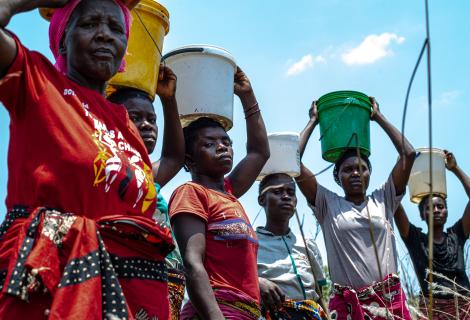ActionAid Zambia reaffirms its position on the IMF Managing Director’s visit.

Zambia will be expecting the IMF Managing Director alongside the US Treasury Secretary for a high-profile country visit. Against the backdrop of debt distress, the Zambian government reached an agreement with the IMF in September 2022 – an Extended Credit Facility (ECF) that would run for 38 months.
This visit should be a chance to address some of the more problematic aspects of that agreement in addition to national budget support, the IMF agreement has been perceived as a critical step in Zambia’s need for public debt restructuring and possible cancellation.
Zambia’s default on external private and bilateral creditors has eased some pressure on the government budget. The IMF and the US should make clear that they will politically and financially support Zambia to remain in default on any creditor which does not agree to the amount of debt cancelation needed to make Zambia’s debt sustainable. If significant progress is made on this debt restructuring or cancelation that would be very much welcomed.
Zambia defaulted on much of its external debt in November 2020. In the two years since it has been trying to get lenders, such as the huge finance company BlackRock, to cancel the debt. Debt Justice has been campaigning in solidarity with the Zambian Civil Society Debt Alliance calling on Western private lenders to cancel the debt. So far, they have refused.
Musonda Kabinga, ActionAid Zambia, Acting Country Director says; “A solution to Zambia’s public debt crisis has been called of by ActionAid and civil society for several years now. The call for transparency and accountability has never been more crucial at a time when private creditors, multilateral partners, and the Government charter a way forward for long-term sustainability. As AAZ we call for a just and lasting solution that protects the rights and needs of the Zambian people at a time of uncertainty and high cost of living.”
David Archer, ActionAid, Senior Economic Justice Lead says; ‘‘Last year the IMF deal involved the government of Zambia agreeing to serious cuts in public spending and tax policies that will hit the poorest the hardest. Zambian citizens are already feeling the pain without seeing any of thein in terms of debt restructuring or cancellation. Sadly, this is repeated in many other African countries, from Senegal to Ghana, from Sierra Leone to Uganda, where IMF policies on public sector wage bills are blocking the recruitment of urgently needed teachers and nurses. It is time for the Managing Director of the IMF to chart a clear new path, away from austerity, prioritising and progressive tax reforms that will ensure education, health, and other public services can be fully financed.’’
The glacial progress of the negotiations has been widely publicised. What is less well known is that since it stopped making many debt payments, Zambia has been able to increase spending on social services. Total public spending per person on social sectors is expected to increase by 22% between 2021 and 2023. This includes healthcare, education, and social protection. The current increases reverse the cuts made in previous years in the name of paying the debt, though still far more money is needed for these sectors. The Zambian government still wants and needs debt cancellation. The current never-ending negotiations on debt relief make it difficult to plan.
Zambia has been in a serious debt crisis, and we recognise that there are no easy solutions. However, the IMF programme fails to pass the burden onto those who are most able to pay. It does not have an equity lens, least of all a gender equity lens. This agreement was reached as the result of a secretive process with key documents remaining unpublished, making it hard for Zambian citizens and civil society to engage in key stages. It is too late to change the core of the agreement now, but we hope that we can work with others in civil society to make the case for progressive and equitable solutions to be found within the coming three years. The visit of the IMF’s top leadership will hopefully be an opportunity to raise the multiple concerns we have with the process and content of the IMF agreement and to change future practices. We will track the continuing impact of this programme and expose the injustices that arise, arguing for alternative paths to be followed that shift the burdens onto those actors who are most able to pay.
To contact the ActionAid Press Office media-enquiries@actionaid.org or call +44 7586107955.
About ActionAid
ActionAid is a global federation that works with more than 15 million people living in more than 40 of the world's poorest countries. We want to see a just and sustainable world, in which everyone enjoys the right to a dignified life and freedom from poverty and oppression. We work for social justice and gender equality and poverty eradication.